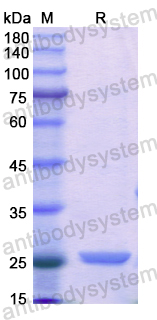Catalog No.
YHD24501
Expression system
E. coli
Species
Homo sapiens (Human)
Protein length
Ile34-Ala261
Predicted molecular weight
26.49 kDa
Nature
Recombinant
Endotoxin level
Please contact with the lab for this information.
Purity
>90% as determined by SDS-PAGE.
Accession
P17538
Applications
ELISA, Immunogen, SDS-PAGE, WB, Bioactivity testing in progress
Form
Lyophilized
Storage buffer
Lyophilized from a solution in PBS pH 7.4, 0.02% NLS, 1mM EDTA, 4% Trehalose, 1% Mannitol.
Reconstitution
Reconstitute in sterile water for a stock solution. A copy of datasheet will be provided with the products, please refer to it for details.
Shipping
In general, proteins are provided as lyophilized powder/frozen liquid. They are shipped out with dry ice/blue ice unless customers require otherwise.
Stability and Storage
Use a manual defrost freezer and avoid repeated freeze thaw cycles. Store at 2 to 8°C for frequent use. Store at -20 to -80°C for twelve months from the date of receipt.
Alternative Names
CTRB, Chymotrypsinogen B, CTRB1
Genetics of circulating proteins in newborn babies at high risk of type 1 diabetes., PMID:40263317
A Common CTRB misfolding variant associated with pancreatic cancer risk causes ER stress and inflammation in mice., PMID:40254337
Acinar cells modulate the tumor microenvironment through the promotion of M1 macrophage polarization via macrophage endocytosis in pancreatic cancer., PMID:40198509
Engineering mouse chymotrypsin B1 for improved trypsinogen degradation., PMID:40133496
Proteogenomic analysis reveals Arp 2/3 complex as a common molecular mechanism in high risk pancreatic cysts and pancreatic cancer., PMID:39890846
A common CTRB misfolding variant associated with pancreatic cancer risk causes ER stress and inflammation in mice., PMID:39211105
Study on the signaling pathways involved in the anti-hyperglycemic effect of raspberry ketone on zebrafish using integrative transcriptome and metabolome analyses., PMID:39189875
Novel Protein Biomarkers and Therapeutic Targets for Type 1 Diabetes and Its Complications: Insights from Summary-Data-Based Mendelian Randomization and Colocalization Analysis., PMID:38931433
Identifying therapeutic targets for cancer among 2074 circulating proteins and risk of nine cancers., PMID:38684708
Association between variants in TCF7L2, CTRB1/2, and GLP-1R genes and response to therapy with glucagon-like peptide-1 receptor agonists., PMID:38453649
Understanding the toxicity mechanism of gelsemine in zebrafish., PMID:38447648
Adiponectin attenuates H2O2-induced apoptosis in chicken skeletal myoblasts through the lysosomal-mitochondrial axis., PMID:38427138
Plasma proteomics-based biomarkers for predicting response to mesenchymal stem cell therapy in severe COVID-19., PMID:38072927
Exploring lncRNAs associated with human pancreatic islet cell death induced by transfer of adoptive lymphocytes in a humanized mouse model., PMID:38027148
Substrate specificity of human chymotrypsin-like protease (CTRL) characterized by phage display-selected small-protein inhibitors., PMID:37604733
[Genetic aspects of type 1 glucagon peptide agonists clinical efficacy: A review]., PMID:37167150
Pharmacogenetic interactions of medications administered for weight loss in adults: a systematic review and meta-analysis., PMID:36999540
Mouse model of PRSS1 p.R122H-related hereditary pancreatitis highlights context-dependent effect of autolysis-site mutation., PMID:36797199
Arg236 in human chymotrypsin B2 (CTRB2) is a key determinant of high enzyme activity, trypsinogen degradation capacity, and protection against pancreatitis., PMID:35934298
Transcriptome analysis provides insight into the anti-diabetic mechanism of theaflavins in high-fat diet and streptozotocin-induced mice., PMID:35106523
Clinically Relevant Circulating Protein Biomarkers for Type 1 Diabetes: Evidence From a Two-Sample Mendelian Randomization Study., PMID:34758976
A 584 bp deletion in CTRB2 inhibits chymotrypsin B2 activity and secretion and confers risk of pancreatic cancer., PMID:34559995
Mouse model suggests limited role for human mesotrypsin in pancreatitis., PMID:33526384
Pharmacogenetics of the Glucagon-like Peptide-1 Receptor Agonist Liraglutide: A Step Towards Personalized Type 2 Diabetes Management., PMID:33272167
Sequencing of the complex CTRB1-CTRB2 locus in chronic pancreatitis., PMID:33036922
Validated Prediction Models for Macular Degeneration Progression and Predictors of Visual Acuity Loss Identify High-Risk Individuals., PMID:30389371
Chronic pancreatitis: an update on genetic risk factors., PMID:29901518
Characterization of centriole duplication in human epidermis, Bowen's disease, and squamous cell carcinoma., PMID:29615326
Genome-wide analysis of disease progression in age-related macular degeneration., PMID:29346644
Functional and association analysis of an Amerindian-derived population-specific p.(Thr280Met) variant in RBPJL, a component of the PTF1 complex., PMID:29302047
An individual 12-h shift of the light-dark cycle alters the pancreatic and duodenal circadian rhythm and digestive function., PMID:28981604
Protective coding variants in CFH and PELI3 and a variant near CTRB1 are associated with age-related macular degeneration†., PMID:28011711
Complex Formation of Human Proelastases with Procarboxypeptidases A1 and A2., PMID:27358403
Pharmacogenetic aspects of the treatment of Type 2 diabetes with the incretin effect enhancers., PMID:27166975
The levels of serine proteases in colon tissue interstitial fluid and serum serve as an indicator of colorectal cancer progression., PMID:27081040
Low-protein diets affect ileal amino acid digestibility and gene expression of digestive enzymes in growing and finishing pigs., PMID:26210756
Differences between clinical and laboratory findings in patients with recent diagnosis of SLE according to the positivity of anti-dsDNA by the Crithidia luciliae method., PMID:25716418
Rapid screening of gene function by systemic delivery of morpholino oligonucleotides to live mouse embryos., PMID:25629157
Identification of genes with consistent methylation levels across different human tissues., PMID:24619003
Functional enrichment by direct plasmid recovery after fluorescence activated cell sorting., PMID:26345509
Pharmacogenetics of oral antidiabetic drugs., PMID:24324494
Pharmacogenetic perturbations in humans as a tool to generate mechanistic insight., PMID:23970522
Autoactivation of mouse trypsinogens is regulated by chymotrypsin C via cleavage of the autolysis loop., PMID:23814066
The CTRB1/2 locus affects diabetes susceptibility and treatment via the incretin pathway., PMID:23674605
Mechanisms of formation of structural variation in a fully sequenced human genome., PMID:23086744
Determinants of chymotrypsin C cleavage specificity in the calcium-binding loop of human cationic trypsinogen., PMID:23035638
Dickkopf-3 maintains the PANC-1 human pancreatic tumor cells in a dedifferentiated state., PMID:21879258
Recombinant Lucilia sericata chymotrypsin in a topical hydrogel formulation degrades human wound eschar ex vivo., PMID:21509949
Identification of pancreatic juice proteins as biomarkers of pancreatic cancer., PMID:20428826
Lysosomal chymotrypsin B potentiates apoptosis via cleavage of Bid., PMID:20361227

